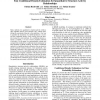990 search results - page 192 / 198 » Learning with non-positive kernels |
AAAI
2010
13 years 7 months ago
2010
Many methods for quantitative structure-activity relationships (QSARs) deliver point estimates only, without quantifying the uncertainty inherent in the prediction. One way to qua...
CORR
2006
Springer
13 years 7 months ago
2006
Springer
We present a novel approach to estimate the time delay between light curves of multiple images in a gravitationally lensed system, based on Kernel methods in the context of machine...
DEBU
2007
13 years 7 months ago
2007
Secure chips, e.g. present in smart cards, TPM, USB dongles are now ubiquitous in applications with strong security requirements. Secure chips host personal data that must be care...
GECCO
2007
Springer
14 years 1 months ago
2007
Springer
As a learning method support vector machine is regarded as one of the best classifiers with a strong mathematical foundation. On the other hand, evolutionary computational techniq...
BCS
2008
13 years 8 months ago
2008
This paper describes a customisable processor designed to accelerate execution of inductive logic programming, targeting advanced field-programmable gate array (FPGA) technology. ...

